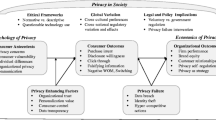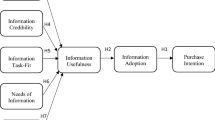Abstract
Nearly all studies of consumers’ willingness to engage in ethical or socially responsible purchasing behavior is based on unconstrained survey response methods. In the present article we ask the question of how well does asking consumers the extent to which they care about a specific social or ethical issue relate to how they would behave in a more constrained environment where there is no socially acceptable response. The results of a comparison between traditional survey questions of “intention to purchase” and estimates of individuals willingness-to-pay for social attributes in products reveal that simple survey questions are too “noisy” to provide operationally meaningful information and overstate intentions to a considerable extent.
Similar content being viewed by others
References
Al-Khatib J. A., Stanton A. D., Rawwas M. Y. A.: 2005, Ethical Segmentation of Consumers in Developing Countries: A Comparative Analysis, International Marketing Review 22(2), 225–246
Auger P., Burke P., Devinney T. M., Louviere J. J.: 2003, What Will Consumers Pay for Social Product Features? Journal of Business Ethics 42(3): 281–304
Auger, P., T. M. Devinney, T. M., and J. J. Louviere: 2007, 'Using Best-Worst Scaling Methodology to Investigate Consumer Ethical Beliefs Across Countries', Journal of Business Ethics, (in press)
Boulstridge E., Carrigan M.: 2000, Do Conusmers Really Care about Corporate Responsibility? Highlighting the Attitude-Behavior Gap, Journal of Communication Management 4(4): 355–368
Box-Steffensmeier J. M., Jacobson G. C., Grant J. T.: 2000, Question Wording and the House Vote Choice: Some Experimental Evidence, Public Opinion Quarterly 64(3): 257–270
Calder B.: 1982, The Concept of External Validity, Journal of Consumer Research 9(4): 240–244
Calder B., Phillips L., Tybout A.: 1981, Designing Research for Application, Journal of Consumer Research 8(3): 197–207
Carrigan M., Attala A.: 2001, The Myth of the Ethical Consumer-Do Ethics Matter in Purchase Behaviour? Journal of Consumer Marketing 18(7): 560–577
Carrigan M., Szmigin I., Wright J.: 2004, Shopping for a Better World? An Interpretive Study of the Potential for Ethical Consumption Within the Older Market, Journal of Consumer Marketing 21(6):401–417
Carson, R. T., T. Groves and M. J. Machina: 2000, ‚Incentive and Informational Properties of Preference Questions’, Unpublished Working Paper, University of California, San Diego
Chen C., Lee S.-Y., Stevenson H. W.: 1995, Response Styles and Cross-Cultural Comparisons of Rating Scales Among East Asian and North American Students, Psychological Science 6(3): 170–175
Christie R., Geis F. L.: 1970, Studies in Machiavellianism. Academic Press, New York
Crane A.: 2001, Unpacking the Ethical Product, Journal of Business Ethics 30(4): 361–373
Crane A., Matten D.: 2004, Business Ethics: A European Perspective: Managing Corporate Citizenship and Sustainability in the Age of Globalization. Oxford University Press, Oxford
Creyer E. H., Ross W. T.: 1997, The Influence of Firm Behavior on Purchase Intention: Do Consumers Really Care About Business Ethics? Journal of Consumer Marketing 14(6): 421–433
Elliott, K. A. and R. B. Freeman: 2001, ‚White Hats or Don Quixotes? Human Rights Vigilantes in the Global Economy’, National Bureau of Economic Research (8102), Cambridge, MA
Forsyth D. R.: 1980, A Taxonomy of Ethical Ideologies, Journal of Personality and Social Psychology 39(1): 175–184
Glaeser E. L., Laibson D. I., Scheinkman J. A., Soutter C. L.: 2000, Measuring Trust, Quarterly Journal of Economics 115(3): 811–846
Harrison R.: 2003, Corporate Social Responsibility and the Consumer Movement, Consumer Policy Review 13(4): 127–131
Klein J. G., Smith N. C., John A.: 2004, Why We Boycott: Consumer Motivations for Boycott Participation, Journal of Marketing 68(3): 92–109
Kotler P.: 1997, Marketing Management: Analysis, Planning, Implementation, and Control. Prentice Hall, Inc., Upper Saddle River, NJ
Louviere J. J., Hensher D. A., Swait J. D.: 2000, Stated Choice Methods: Analysis and Applications. Cambridge University Press, Cambridge, UK
Marymount-University: 1999, The Consumers and Sweatshops, Vol. 1999 (Marymount University Center for Ethical Concerns)
Mason, T.: 2000, ‚The Importance of Being Ethical’, Marketing 26 October, 27
Miller A. S., Mitamura T.: 2003, Are Surveys on Trust Trustworthy? Social Psychology Quarterly 66(1): 62–70
Paulhus D. L.: 1991, Measurement and Control of Response Bias, in Robinson J. P., Shaver P. R., Wright L. S. (eds.), Measures of Personality and Social Psychological Attitudes. Academic Press, San Diego, CA, pp. 17–59
Rogers, D.: 1998, `Ethical Tactics Arouse Public Doubt', Marketing (August 6), 12–13
Rucinski D.: 1993, Rush to Judgment? Fast Reaction Polls in Anita Hill-Clarence Thomas Controversy, Public Opinion Quarterly 57(4): 575–592
Schwarz N.: 1999, Self-Reports: How the Questions Shape the Answers, American Psychologist 54(2): 93–105
Schwarz N.: 2003, Self-Reports in Consumer Research: The Challenge of Comparing Cohorts and Cultures, Journal of Consumer Research 29(4): 588–594
Schwarz N., Grayson C. E., Knauper B.: 1998, Formal Features of Rating Scales and the Interpretation of Question Meaning, International Journal of Public Opinion Research 10(2): 177–183
Schwarz N., Hippler H. J.: 1995, Subsequent Questions May Influence Answers to Preceding Questions in Mail Surveys, Public Opinion Quarterly 59(1): 93–97
Schwarz N., Oyserman D.: 2001, Asking Questions about Behavior: Cognition, Communication, and Questionnaire Construction, American Journal of Evaluation 22(2): 127–160
Simon F. L.: 1995, Global Corporate Philanthropy: A Strategic Framework, International Marketing Review 12(4): 20–37
Spar D. L., La Mure L. T.: 2003, The Power of Activism: Assessing the Impact of NGOs on Global Business, California Management Review 45(3): 78–101
Steenkamp J.-B. E. M., Ter Hofstede F.: 2002, International Market Segmentation: Issues and Outlook, International Journal of Research in Marketing 19(3): 185–213
Strong C.: 1996, Features Contributing to the Growth of Ethical Consumerism: A Preliminary Investigation, Marketing Intelligence & Planning 14(5): 5–13
Tourangeau R., Smith T. W.: 1996, Asking Sensitive Questions: The Impact of Data Collection Mode, Question Format, and Question Context, Public Opinion Quarterly 60(2): 275–304
Ulrich P., Sarasin C.: 1995, Facing Public Interest: The Ethical Challenge to Business Policy and Corporate Communications. Kluwer Academic Publishers, Boston
Uusitalo O., Oksanen R.: 2004, Ethical Consumerism: A View from Finland, International Journal of Consumer Studies 28(3): 214–221
Zwick R., Chen X.: 1999, What Price Fairness? A Bargaining Study, Management Science 45(6): 804–823
Acknowledgements
This research was supported financially by the Australian Research Council through its Discovery Grant program. Additional financial support was forthcoming from the Centre for Corporate Change at the Australian Graduate School of Management.
Author information
Authors and Affiliations
Corresponding author
Additional information
Pat Auger is Associate Professor at the Melbourne Business School. Timothy M. Devinney is Professor and Professorial Research Fellow at the Australian Graduate School of Management.
Rights and permissions
About this article
Cite this article
Auger, P., Devinney, T.M. Do What Consumers Say Matter? The Misalignment of Preferences with Unconstrained Ethical Intentions. J Bus Ethics 76, 361–383 (2007). https://doi.org/10.1007/s10551-006-9287-y
Received:
Accepted:
Published:
Issue Date:
DOI: https://doi.org/10.1007/s10551-006-9287-y




